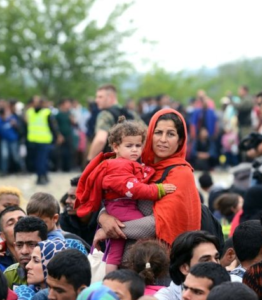Women migrants neglected in global policy – UN report
Almost half of the world’s one billion migrants are women – yet government policies almost uniformly favour a male-dominant approach to migration, according to a new United Nations report.
The report says most governments’ policies ignore the stark risks and frequent violence that women migrants across the globe face every day.
Violence is not the only factor that disproportionately affects women migrants, but it remains a major cause of global concern due to its high prevalence and the causal effect it has on other areas of women’s human rights and health needs, the ‘Progress of the World’s Women 2019 Report’ says.
At the same time, a new Doctors With Borders survey found that 31.4 per cent of women migrants to Mexico faced sexual abuse on their route through Central America; and 59 per cent of these women also showed symptoms of depression.
And women travelling through Libya also face the almost certain prospect they will be sexually violated, according to the European Network on Migrant Women.
The UN report lays bare the historic global complacency in addressing women migrant’s needs, and the impact of that on families.
The report recommends investing in social protections including access to sexual and reproductive healthcare, as well as childcare as e a crucial first step in ensuring that women and their children are able to live dignified, economically empowered, and healthy lives in their new homes.
But it says that addressing violence against women before and during migration requires political will governments have not historically been willing to take.
Services aimed at addressing women’s specific needs have traditionally been thought of as “extra,” not essential services, the report says.
It points out the low number shelters built to cater to migrant women; it notes overcrowding, and badly lit public bathrooms in shelters increases the risk of gender-based violence.
The report says that there is a huge lack of investment in woman’s welfare and the “fundamental basics” are not being met.
Legally, migrant women face challenges to basic resources and civil independence for themselves and their children,’ it says.
This is particularly acute in Iraq, Saudi Arabia and Kuwait where women cannot legally pass citizenship along to her children, denying them access to education, healthcare, and civil rights protections.
Many women migrants who flee violence face difficulties obtaining citizenship for themselves, as forced marriage and domestic violence has not been historically strong grounds for gaining asylum.
And, with minimal access to the labour market, many women migrants enter the informal care sector, where there are minimal protections against harsh working conditions, and many women face deskilling and low wages, the report says.
“Families are the lynchpin of care systems, sustaining their members, developing their human capabilities and reproducing an active labour force. While there are considerable variations in how families provide care for their members, the bulk of this work, and its costs, are borne by women and girls,” the report says.
“Globally, women do three times as much unpaid care and domestic work as men do. As increasing numbers of women have taken on a breadwinning role, there have been surprisingly few changes in men’s assumption of caregiving,” it says.
Changing demographic and family structures, as well as migration impact care arrangements,” the report says.
“In the poorest countries, high fertility rates and the resultant high care dependency ratios for young children, coincide with a lack of an institutionalized care infrastructure. Providing universal, quality early childhood education and care services is an investment with significant medium- and long-term.
“Families are key sites for the provision and receipt of care, but the types of support family caregivers can rely on are of enormous significance. Caring families need to be bolstered by caring societies that invest in universal, gender-responsive and sustainable care systems,” the report concluded.
Read the full report here: http://www.unwomen.org/-/media/headquarters/attachments/sections/library/publications/2019/progress-of-the-worlds-women-2019-2020-en.pdf?la=en&vs=3512












